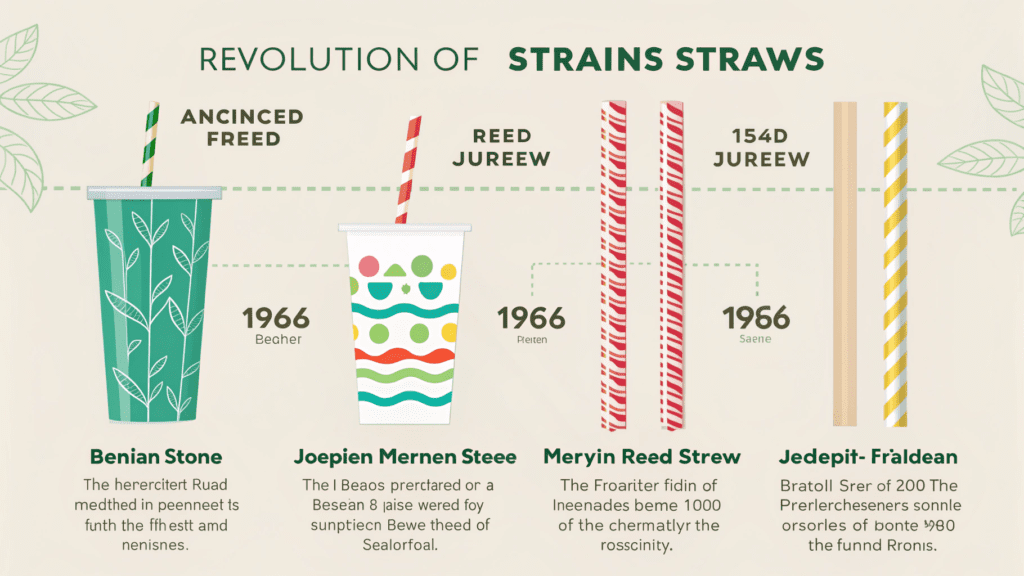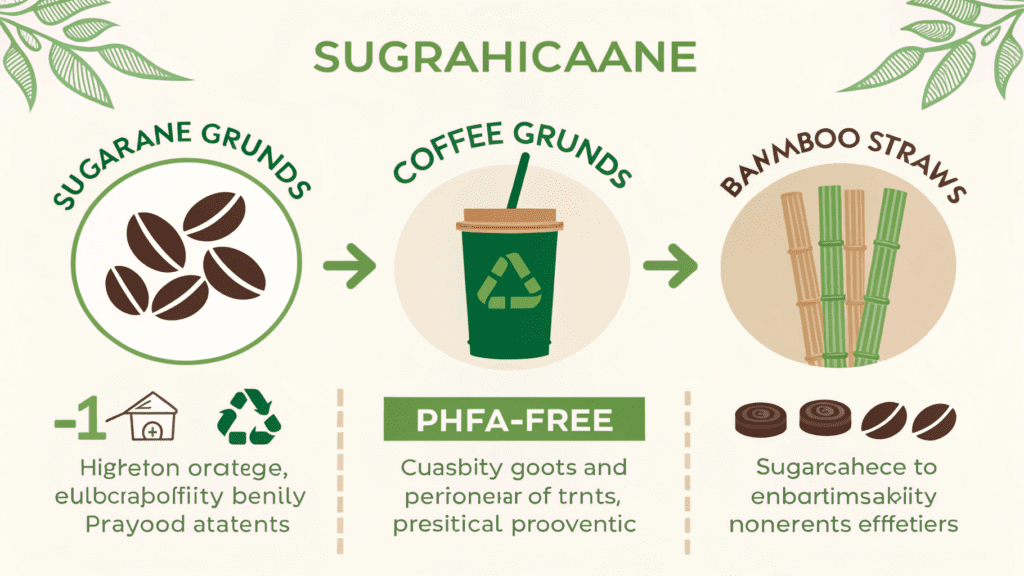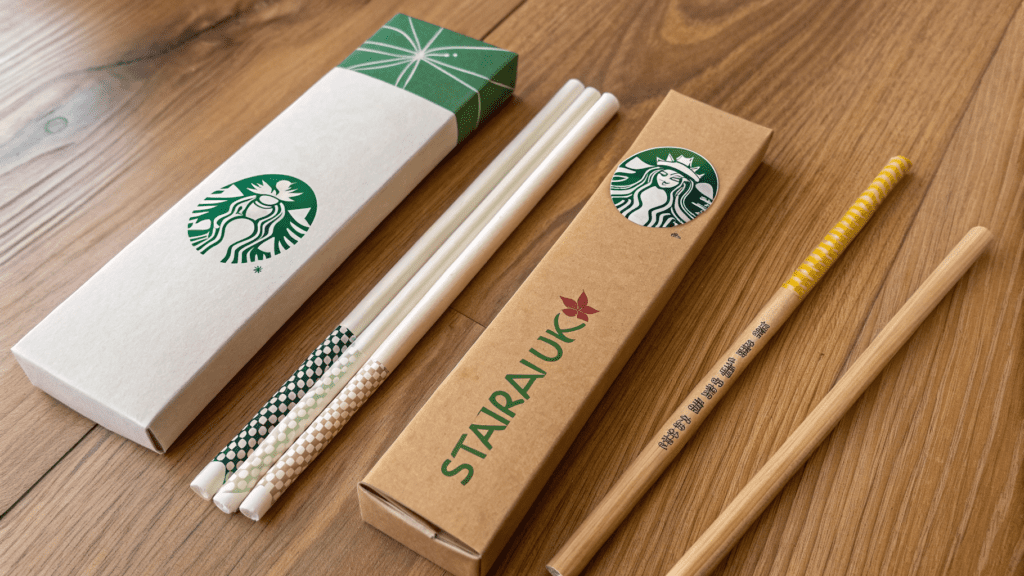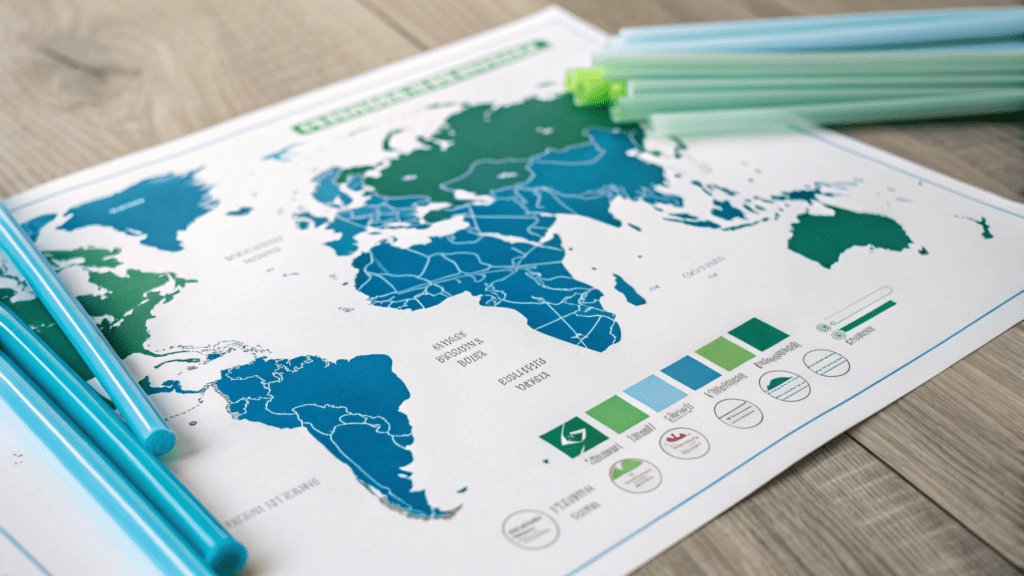I. Introduction: The New Imperative for Hospitality – Beyond Plastic, Towards Purpose
- A. The Shifting Sands of Consumer Expectation: The hospitality sector stands at a critical juncture. Eco-conscious consumers are no longer a niche market; they are a driving force. Businesses are facing unprecedented pressure to demonstrate tangible commitments to sustainability, moving beyond superficial gestures to genuine environmental stewardship. This transformation is particularly acute in hospitality, where single-use items contribute significantly to waste. The sector’s response to this pressure will define its future success.
- B. Introducing the Solution: Branded Biodegradable Straws: Enter branded biodegradable straws – a simple yet powerful solution. More than just an alternative to plastic, these straws are a visible manifestation of a business’s dedication to environmental responsibility. Imprinted with a logo, rendered in custom colors, and thoughtfully packaged, they become a tangible symbol of a brand’s values, extending its identity beyond the beverage itself. They transform a functional item into a marketing asset.
- C. What You’ll Discover: This B2B guide provides decision-makers with a comprehensive understanding of the biodegradable straw market. From the intricacies of material science and the nuances of regulatory compliance to the strategies for strategic sourcing, we will equip you with the knowledge to make informed choices. Learn how to navigate this evolving landscape, ensuring your decisions benefit both your bottom line and the planet.

II. The Environmental Awakening: From Plastic Ubiquity to Sustainable Innovation
- A. A Brief History of the Straw: From Rye to Reliance on Plastic
- From ancient Sumerian reeds and precious metal tubes used to sip beer, to Marvin Stone’s 1888 invention of the paper straw, and Joseph Friedman’s 1937 innovation of the bendy straw, drinking implements have undergone a long evolution.
- The post-World War II era witnessed an explosion in the popularity of plastic straws. Cheap, durable, and seemingly indispensable, they became a staple of the burgeoning fast-food industry. However, their convenience masked a significant environmental burden.
- The tide began to turn with growing public awareness of plastic pollution. Viral images, such as the 2015 video of a sea turtle with a plastic straw lodged in its nostril, catalyzed a global backlash against single-use plastics, igniting a search for sustainable alternatives.
- B. Understanding Biodegradable Straws: More Than Just “Not Plastic”
- Definition: Biodegradable straws represent a fundamental shift towards environmental responsibility. They are designed to decompose naturally, minimizing plastic pollution and reducing their overall ecological footprint. They represent a commitment to a circular economy.
- Key Materials Explored:
- Sugarcane Bagasse: Upcycled from agricultural waste, sugarcane bagasse straws are 100% plant-based, boasting impressive durability and resistance to both heat and cold. They avoid sogginess and flavor transfer, offering a superior user experience.
- Coffee Grounds: These straws harness the power of recycling, utilizing natural and renewable coffee grounds. Durable and tasteless, they are plastic-free and impart a subtle aroma, creating a unique selling point for discerning businesses.
- PHA (Polyhydroxyalkanoate): Representing the cutting edge of bioplastic technology, PHA straws mirror the performance of traditional plastic. Yet, they are fully biodegradable in both marine and soil environments, holding certifications for compostability.
- Bamboo: Rapidly renewable and highly sustainable, bamboo offers durable, reusable, and disposable straw options. Naturally antibacterial, they are a compelling choice for businesses seeking environmentally conscious solutions.
- Initial Benefits for Your Business: Adopting biodegradable straws transcends mere compliance; it elevates your brand. Instantly enhance your reputation, attract eco-conscious customers, and position your business as a leader in sustainability.
III. Making the Right Choice: Performance, Purity, and Public Perception
- A. Deep Dive into Material Performance: A B2B Comparison List
- Sugarcane Straws:
- Profis: 100% plant-based composition ensures environmental responsibility. Exceptional strength and durability eliminate sogginess, maintaining a premium user experience. Suitable for a wide range of beverages, both hot and cold. Certified compostable, with some varieties achieving home compostability. Free from plastics, petroleum, dyes, and harmful PFAS “forever chemicals”.
- Considerations: Upfront cost is typically higher than traditional plastic alternatives, requiring a strategic assessment of budget and ROI.
- Coffee Ground Straws:
- Profis: Crafted from recycled coffee grounds, diverting waste from landfills and promoting a circular economy. Natural and renewable resource utilization minimizes environmental impact. Durable construction prevents cracking and breaking, ensuring reliable performance. Suitable for both hot and cold beverages. The subtle coffee aroma can serve as a unique selling point, enhancing the consumer experience. Entirely plastic-free and compostable, contributing to a closed-loop system.
- Considerations: The distinctive aroma may not align with all brand aesthetics, requiring careful consideration of brand identity and target audience.
- PHA Straws:
- Profis: Mimicking the look and feel of traditional plastic, PHA straws offer a seamless transition for consumers. Unparalleled biodegradability in marine and soil environments addresses a critical environmental challenge. Certified compostable for both home and industrial composting, ensuring versatile disposal options. Plant-based composition reduces reliance on fossil fuels, lowering GHG emissions.
- Considerations: Higher production costs may impact budget allocation. Limited availability may present sourcing challenges, requiring proactive supply chain management.
- Bambusstrohhalme:
- Profis: Unmatched sustainability due to bamboo’s rapid growth rate, ensuring resource availability. Reusable and disposable options cater to diverse business needs. Natural antibacterial properties enhance hygiene and safety. Sturdy construction provides reliable performance.
- Considerations: Reusable varieties necessitate thorough cleaning protocols. Potential woody taste may affect the sensory experience for some consumers. Higher costs may apply to certain formats, demanding careful evaluation.
- Avoid the Pitfalls: What to Watch Out For
- Papierstrohhalme: While often presented as an eco-friendly option, paper straws frequently become soggy, detracting from the user experience. Furthermore, they can impart an undesirable “papery” taste to beverages.
- PLA-Strohhalme (Polymilchsäure): These straws require specialized industrial composting facilities to decompose effectively. They may not break down in landfills or marine environments, potentially contaminating recycling streams if mixed improperly.
- Controversy: PFAS “Forever Chemicals”: Crucial Insight: A concerning number of “biodegradable” paper and plant-based straws have been found to contain PFAS, casting doubt on their environmental claims and raising potential health concerns. The presence of these persistent chemicals undermines true biodegradability. Prioritize suppliers who provide certified PFAS-free alternatives.
- Sugarcane Straws:
- B. Branding Beyond the Beverage: Elevating Your Identity
- Logo Printing: Direct printing using food-safe inks allows for prominent logo placement. Elegant laser engraving on bamboo straws creates a sophisticated, lasting impression.
- Custom Colors: Match your brand’s precise Pantone colors for a cohesive aesthetic, particularly advantageous for bulk orders, ensuring brand consistency across all touchpoints.
- Tailored Packaging: Elevate your brand experience with individually wrapped straws featuring custom logos, branded boxes that reinforce your message, or eco-friendly pouches that extend your commitment to sustainability.
- Industry Insight: “Adopting eco-friendly products significantly enhances a brand’s image and reputation within the hospitality sector, serving as a key differentiator in a competitive market.” – PWC Survey on Consumer Sustainability Preferences. This resonates with the statistic that 66% of consumers are willing to pay a premium for sustainable products and services, demonstrating the tangible value of environmental responsibility.

IV. The Regulatory Landscape & Future-Proofing Your Operations
- A. Staying Compliant: Global and Local Regulations
- The EU Single-Use Plastics Directive (SUPD): This landmark regulation, effective July 2021, banned single-use plastic straws and other items across member states, setting a new standard for environmental responsibility.
- External Link: European Union Single-Use Plastics Directive
- Beyond Europe: Regional bans are proliferating, with significant actions taken in Canada, China, the UK, India, and New Zealand, signaling a global convergence towards sustainability.
- U.S. State and City Level Actions: From “straw upon request” policies in states like California and New York to outright bans in cities like Washington D.C., the U.S. is witnessing a patchwork of regulations, necessitating proactive adaptation.
- The Regulatory Imperative: Embracing sustainable alternatives is no longer merely a matter of corporate social responsibility; it is essential for avoiding fines, ensuring operational continuity, and maintaining a competitive edge in an increasingly regulated landscape.
- The EU Single-Use Plastics Directive (SUPD): This landmark regulation, effective July 2021, banned single-use plastic straws and other items across member states, setting a new standard for environmental responsibility.
- B. Decoding Certifications: “Biodegradable” vs. “Compostable” and What Matters for B2B
- The Critical Distinction:
- Biodegradable: While designed to break down over time, the conditions required vary widely. Critically, biodegradable materials can still leave behind microplastics or harmful residues, particularly if PFAS are present.
- Compostable: Representing the gold standard for circularity, compostable materials break down into nutrient-rich compost, water, and CO2 within a specific timeframe (e.g., 90-180 days) under controlled industrial or home composting conditions, leaving no harmful residues.
- Key Certifications You Need to Know:
- BPI (Biodegradable Products Institute): The North American standard (ASTM D6400, D6868) for industrial compostability. Look for the BPI logo to ensure verifiable compliance.
- TÜV Austria (OK Compost INDUSTRIAL / HOME): The European equivalent (EN 13432) for industrial and home compostability. TÜV Austria also offers certifications for marine and soil biodegradability, providing comprehensive assurance.
- ASTM International Standards (D6400, D6868, D5338): These foundational scientific and technical standards define the methodologies for testing the compostability and biodegradability of plastics, providing the backbone for credible certifications.
- Why Certifications Matter: Certifications provide verifiable proof against greenwashing claims, ensuring that your investment genuinely supports environmental goals and meets stringent legal requirements, safeguarding your brand reputation.
- The Critical Distinction:

V. Strategic Sourcing: Partnering for Sustainable Success
- A. Choosing Your Ideal Supplier: Beyond the Price Tag
- Minimum Order Quantity (MOQ): Thoroughly understand a supplier’s MOQ (e.g., 20,000 straws for custom orders) to align with your business volume and inventory management strategy. Remember that larger orders often translate to more favorable unit costs.
- Customization Capabilities: Rigorously confirm comprehensive branding options for both the straw itself and its packaging. Ensure the supplier can deliver your vision with precision and quality.
- Lead Times: This is crucial for seamless supply chain planning. Inquire about production and delivery timelines, particularly for custom orders (e.g., 12-14 weeks for branded straws). Factor in potential delays to avoid disruptions.
- Quality Checks & Certifications: Demand suppliers with robust quality control measures. Request samples to rigorously test durability and performance. Critically verify certifications (BPI, TÜV, FDA, ISO) to ensure product safety and that environmental claims are legitimate and verifiable.
- Supplier Reputation & Customer Support: Seek a supplier with a proven track record, positive testimonials, and responsive communication. A smooth partnership relies on trust, transparency, and reliable support.
- Internal Link: At Momoio, we pride ourselves on a dedicated B2B service, high-quality certified eco-tableware, and proven environmental impact.
- B. The Future is Biodegradable: Innovations and Market Outlook
- Continuous Material Innovation: Ongoing research and development in PHA, polysaccharide-based materials, and advanced biodegradable coatings are actively addressing past challenges, such as sogginess and cost, enhancing durability and performance.
- Advanced Manufacturing Technologies: Innovations in production methods are driving the development of lightweight, durable, and cost-effective eco-friendly straws at scale, making sustainable solutions more accessible.
- Market Growth Projections: The global biodegradable straw market is poised for substantial growth, with projections indicating a CAGR of 22.46% to reach USD 204.167 billion by 2031, signifying a powerful shift across the hospitality and foodservice industries.
- Integrating Sustainability as a Core Brand Value: Increasingly, businesses are strategically leveraging sustainable practices as a competitive advantage and a cornerstone of their brand identity, resonating with conscious consumers and attracting talent.

VI. Conclusion: Your Next Step Towards a Greener Future
- A. The ROI of Responsibility: Investing in branded biodegradable straws yields multifaceted returns, strengthening your brand image, cultivating customer loyalty, ensuring regulatory compliance, and making a significant contribution to environmental stewardship – a holistic and compelling ROI.
- B. Be a Leader, Not a Follower: The time to embrace this sustainable shift is now. Position your business as an industry innovator, setting the standard for environmental responsibility and inspiring others to follow.
- C. Ready to Make the Switch?
- Internal Link: Explore our range of certified biodegradable straws, including sugarcane and coffee ground options, designed for B2B excellence: Momoio Biodegradable Straws.
- Internal Link: Contact our experts today to discuss your custom branding needs and get an exclusive quote: Kontakt Momoio.
- External Link: Learn more about global efforts to reduce plastic pollution and how your business can contribute: WWF Plastic Pollution
- External Link: Explore further sustainability guidelines for the restaurant industry: National Restaurant Association – Sustainability.






